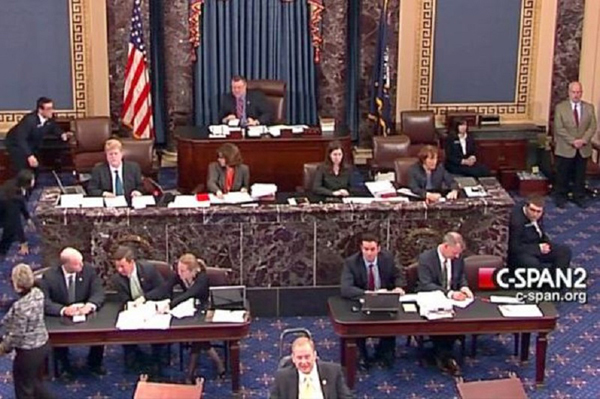- La Feria Community Holds Succesful Business Mixer Event
- Little Nashville to Take Place in Downtown Mercedes
- Lions Basketball Captures District Gold
- La Feria ISD Students Compete in Regional Chess Tournament
- Lions End First Half of 32-4A on a High Note
- La Feria ISD Held Another Successful Parent Conference
- Strong Appearance for Lions at Hidalgo Power Meet
- LFECHS Students Get to Meet Local Actress
- Students Participate in Marine Biology Camp
- Two LFECHS Students Qualify for All-State Band
Texas Health Clinics in Limbo Until Congress Renews Funding
- Updated: February 16, 2018

Congress must approve a new budget by Thursday to keep the federal government open. One of many items at stake is funding for Community Health Centers that serve people who are low-income or uninsured. (C-SPAN)
by Mark Richardson
SAN ANTONIO, Texas – More than 1 million uninsured Texans are in limbo, waiting for Congress to approve funding for the neighborhood clinics known as Community Health Centers.
Lawmakers face a Thursday deadline to approve a new budget to avoid another federal government shutdown.
The Federally Qualified Health Centers program wasn’t renewed in October, and unless Congress acts, it will run out of money on April 1.
Jose Camacho, director of the Texas Association of Community Health Centers, says both doctors and their patients are worried about what the future holds.
“It’s causing a lot of instability and long-term damage in our environment, not only in recruiting staff but retaining current staff, and things like leases,” Camacho states.
Camacho says there are 72 community clinic systems in Texas that are often the only health care option for low-income and uninsured families.
In most cases, more than half of their funding comes from the federal program. He adds that Texas leads the nation in the number of uninsured residents.
Ernesto Gomez, CEO of CentroMed, says the uncertainty is already making it difficult to keep the doors open.
“We have some of our existing physicians on staff beginning to ask about our financial stability,” he states. “It’s difficult to recruit new physicians, because they wonder whether we are going to be able to continue with current level of operations.”
If the funds are cut off, Camacho says thousands of the state’s most vulnerable people could lose access to health care.
“It would deal a devastating blow,” he stresses. “Even the ones that are already running cost effectively and efficiently would have to look at laying off critical providers.”
Community health centers provide free or low-cost health care through grants and donations as well as local, state and federal dollars.
Lawmakers have until midnight Thursday to OK a budget – or at least a temporary extension – to keep the clinics, and the government, running.


